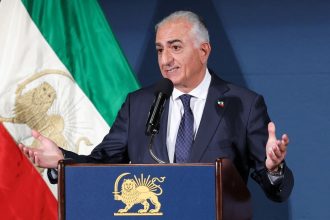Saudi Crown Prince Mohammed bin Salman is preparing for a grand reception in Washington today as US President Donald Trump hosts him for the first time since the 2018 killing of journalist Jamal Khashoggi. The visit is expected to include high-profile defense and nuclear agreements, reflecting the deepening ties between the United States and the oil-rich kingdom.
Trump is reportedly planning a red-carpet welcome, complete with a fly-by, cannon salute, and a gala dinner—an extravagant reception usually reserved for visiting heads of state, even though Prince Mohammed is technically the de facto ruler rather than a formal head of state.
The US president has emphasized strengthening ties with Saudi Arabia, recently pledging to sell the kingdom coveted F-35 stealth fighter jets, despite concerns from Israel. In addition, a framework for civilian nuclear cooperation will be signed, signaling broader strategic collaboration.
Trump is also expected to urge Prince Mohammed, commonly known as MBS, to take steps toward normalizing relations with Israel, aiming to advance a broader Middle East peace plan in the aftermath of the Gaza conflict. “We’re more than meeting,” Trump said aboard Air Force One. “We’re honoring Saudi Arabia, the Crown Prince.”
For Prince Mohammed, this visit marks a chance to reset his image on US soil after the Khashoggi incident sparked international outrage and cooled ties with Washington. While allegations linger that he approved the operation inside the Saudi consulate in Istanbul—a claim Saudi officials deny—MBS has maintained a close relationship with Trump and his family, previously cemented by a $600 billion investment pledge during Trump’s visit to Saudi Arabia.
Security and Strategic Priorities
Alongside arms deals, the Crown Prince seeks stronger US security guarantees, particularly after Israeli strikes in September on Qatar, a key US ally, heightened regional tensions. Riyadh is pursuing advanced air and missile defense systems and high-tech chips to fuel its ambitions in artificial intelligence.
However, normalization with Israel remains a sensitive issue. Despite Trump’s desire to see Saudi Arabia join the Abraham Accords, Riyadh is cautious, demanding progress on the international push for a Palestinian state before committing to any diplomatic shift.
The visit will also spotlight economic collaboration, with a US-Saudi investment forum in Washington featuring discussions on energy and AI. The Trump family’s business connections with the kingdom continue to flourish; Saudi developer Dar Global recently announced a partnership with the Trump Organization to build a luxury Maldives hotel, allowing investors to participate via digital tokens.
As both leaders showcase their close personal and political ties, the visit underscores not only strategic interests but also the human dimension of diplomacy—two figures navigating complex global issues while maintaining a highly publicized camaraderie.








